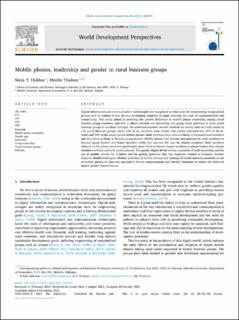| dc.contributor.author | Holden, Stein Terje | |
| dc.contributor.author | Tilahun, Mesfin | |
| dc.date.accessioned | 2022-02-25T06:58:23Z | |
| dc.date.available | 2022-02-25T06:58:23Z | |
| dc.date.created | 2021-11-25T12:47:25Z | |
| dc.date.issued | 2021 | |
| dc.identifier.citation | World Development Perspectives. 2021, 24 . | |
| dc.identifier.issn | 2468-0532 | |
| dc.identifier.uri | https://hdl.handle.net/11250/2981336 | |
| dc.description.abstract | Digital information and communication technologies are recognized as vital tools for empowering marginalized groups such as women in low income developing countries through reducing the costs of communication and connectivity. This study aimed at assessing the gender difference in mobile phone ownership among youth business group members, and how it affects election into leadership and group board positions in rural youth business groups in northern Ethiopia. We used instrumental variable methods on survey data on 1125 youths in 119 youth business groups where 32% of the members were female. Our results indicated that 37% of the females and 70% of the males owned mobile phones. Male members were twice as likely to become board members and five times as likely to become group leaders. Mobile phones had become instrumental for male members to become group leaders and board members while this was not the case for female members. Male members without mobile phone were not significantly more likely to become board members or group leaders than female members without and with mobile phones. The gender digital divide is thus a question of both ownership and the use of mobile phones for business and for getting positions that can empower women in business. Further research should investigate whether provision of mobile phones and training of female business members in use of mobile phones for business can lead to female empowerment and thereby eliminate or reduce the observed digital gender discrimination. | |
| dc.language.iso | eng | |
| dc.relation.uri | https://doi.org/10.1016/j.wdp.2021.100370 | |
| dc.title | Mobile phones, leadership and gender in rural business groups | |
| dc.type | Peer reviewed | |
| dc.type | Journal article | |
| dc.description.version | publishedVersion | |
| dc.source.pagenumber | 0 | |
| dc.source.volume | 24 | |
| dc.source.journal | World Development Perspectives | |
| dc.identifier.doi | 10.1016/j.wdp.2021.100370 | |
| dc.identifier.cristin | 1958986 | |
| dc.relation.project | Norges forskningsråd: 288238 | |
| cristin.ispublished | true | |
| cristin.fulltext | original | |
| cristin.qualitycode | 1 | |
